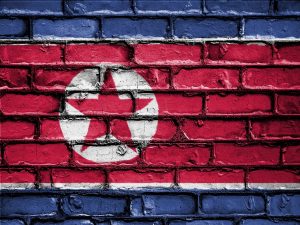The ongoing anti-racism protests in the United States have catalyzed movements of solidarity globally and inspired calls to address the systemic and widespread racism both in the U.S. and throughout the world. The United States, widely seen as the custodian of international order, has come under fire from its international adversaries, too, not least, China, Iran, and North Korea.
The widespread protests across the United States provide an opportunity for those states that resent the U.S.-led international order to stigmatize their enemy once more. Challenges have come from great powers, such as China, but also from North Korea. Pyongyang has always remained highly cognizant of, and responsive to, international events, not least those involving its adversary of the United States.
North Korea has constantly chastised the antagonistic international environment in which it finds itself, and, in so doing, violated the rules and norms of international order – not least through nuclear development and human rights abuses. Now the U.S. protests have opened another door for Pyongyang to deride the United States.
North Korea’s enduring critique of the United States rests on the notion of a U.S. “hostile policy.” Yet this is far from a simple “policy,” as the word is generally understood. Rather, the idea of a “hostile policy” is all-encompassing, ranging from the joint U.S.-South Korean annual military exercises around the Korean Peninsula to U.S. rhetoric condemning Pyongyang’s nuclear ambitions and human rights violations, as well as anti-DPRK leaflets sent from South Korean activist groups, and the crucial unilateral and multilateral economic sanctions imposed upon North Korea Pyongyang’s definition of the U.S. “hostile policy” only seems to widen over time. In spite of two presidential-level U.S.-North Korea summits in 2018 and 2019, and an allegedly impromptu meeting at the Demilitarized Zone in June 2019, Washington is still frequently criticized for its “hostile policy” vis-à-vis Pyongyang, now in the form of a lack of sanctions easing, for example.
Now the components of the “hostile policy” may further broaden, as North Korea may seek to revive its claim of the United States as a “human rights violator.”
North Korean state media, such as Rodong Sinmun, have capitalized upon the U.S. unrest, highlighting how protesters “condemned” the police brutality in the murder of George Floyd, and that there is neither “justice” nor “peace” in Trump’s America. Yet, we must remember that Pyongyang’s denigration of the United States as a violator of human rights is nothing new: back in 2016, the Pyongyang Times decried the United States as “a human rights wasteland.” Following the United Nations Report of the Commission of Inquiry (COI) on Human Rights in the Democratic People’s Republic of Korea, released in 2014, North Korea’s response was clear, yet bellicose: It was the U.S., not the DPRK, that was the actual human rights violator. According to the regime, Washington was using the UN report as a means to defame and “strangle” the North’s socialist system, an age-old tactic that North Korea deemed to be part of the “human rights offensive” by the United States – and its “puppet” ally of South Korea – to justify intervention and regime change. As the North Korean Foreign Ministry stressed at the time, the United States invoked the language of humanitarian intervention in Iraq, and Libya, but the DPRK would not allow itself to suffer a fate akin to the regimes of Saddam Hussein and Muammar Gaddafi. In November 2014, the North Korean Foreign Ministry used the COI report to justify the bolstering of its nuclear deterrent, as compelled by the U.S. “hostile policy.” For North Korea, the United States is anything but a peace-loving liberal hegemon; rather, it is a war-mongering state whose ultimate goal is to interfere in other’s domestic affairs.
Fast forward to 2020, and Pyongyang could use the domestic protests engulfing the United States as a further evidence of Washington’s anti-DPRK “hostile policy.” Why, according to North Korea, should the U.S. exert pressure on other states for not following its own domestic political model, if the United States cannot even succeed in implementing its own ideals?
A headline on Rodong Sinmun stated the phrase, “I can’t breathe,” a reference to the last words of George Floyd as a police officer knelt on his neck. In doing so, North Korea is making a clear point that the United States may claim to be the champion of the liberal international order, but the U.S. should not, and will not be allowed to, “isolate and suffocate” the DPRK.
After the “no-deal” outcome of the second Trump-Kim summit at Hanoi in February 2019, and the collapse of U.S.-DPRK working-level talks in Stockholm in October last year, the North Korea asserted that it had lost interest in negotiations. Yet we should not be surprised if, in the future, the mouthpieces of the North Korean state invoke the current protests to serve their own interests vis-à-vis the United States. From the eyes of Pyongyang, the unrest is proof that the United States cannot even respect the rights of its own citizens; it is not only “hostile” toward North Korea, but also to its own people.
North Korea’s trust in the United States has never been high, especially after the collapse of the 1994 Agreed Framework. In light of the stalling of more recent talks, such trust will no doubt wane further, and may reach a nadir. Prospects of further U.S.-DPRK negotiations, at least in the short-to-mid-term, look bleak. At the same time, North Korea’s definition of the U.S. “hostile policy” will only further expand, since the DPRK will do anything to avoid making substantial concessions on its nuclear program without sanctions easing, and seeks to negotiate with the United States on nothing less than its own terms.
Edward Howell is a Stipendiary Lecturer in Politics at New College, University of Oxford.

































